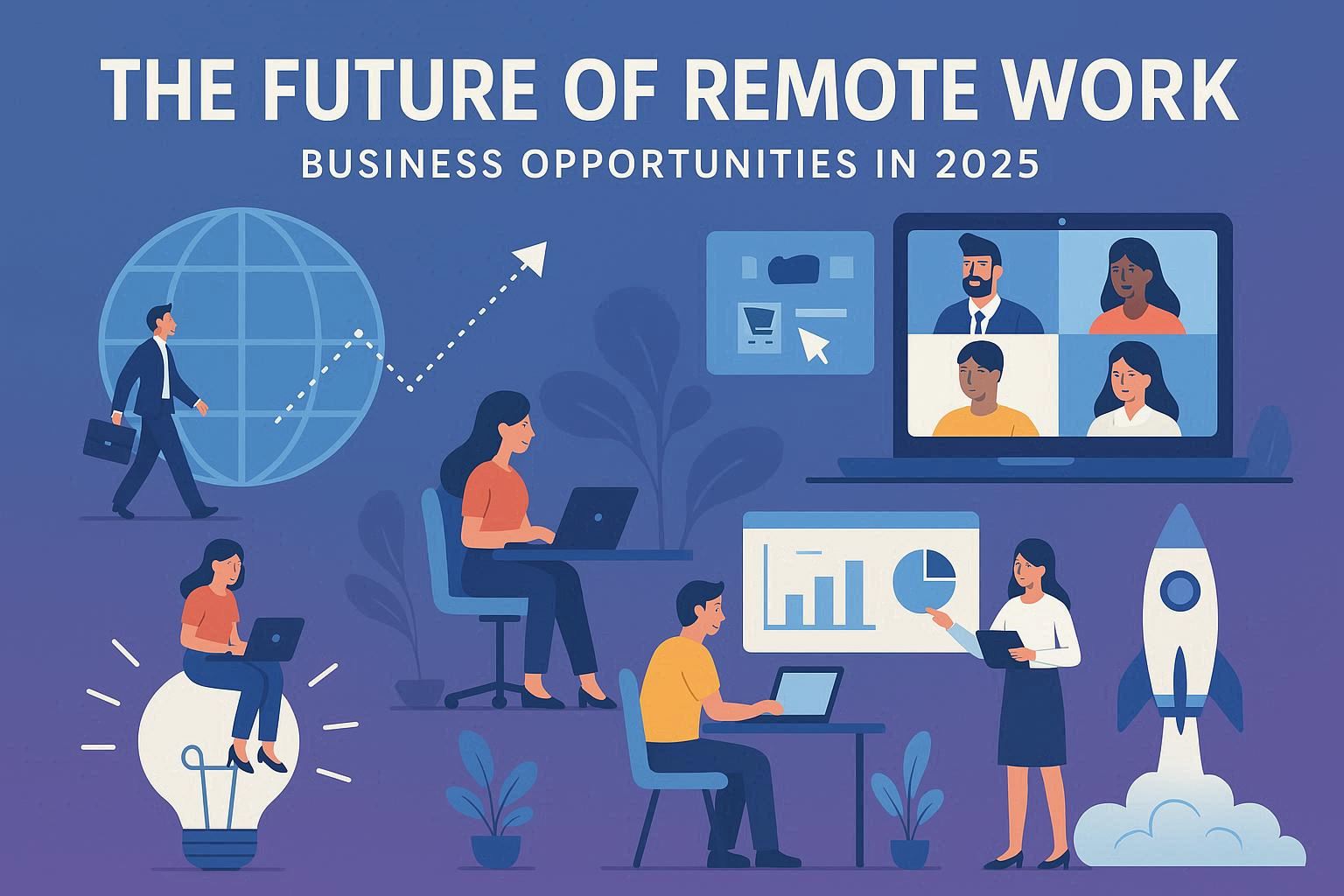Remote work has transformed the global economy, shifting how businesses operate and how employees connect with their jobs. What was once a temporary adjustment during the pandemic has become a permanent trend, influencing entrepreneurship, technology adoption, and workforce dynamics. In 2025, remote work is not just a perk but a driving force for new business opportunities. For entrepreneurs and companies, understanding this evolution is key to thriving in today’s digital economy.
1. The Rise of Remote-First Companies
1.1 Shifting Business Models
Businesses no longer see remote work as an experiment. Entire organizations are now operating with a remote-first strategy. This means companies are prioritizing online tools, flexible schedules, and distributed teams. Entrepreneurs entering the market have the chance to create businesses that are fully digital, avoiding the overhead costs of physical offices.
1.2 Global Talent Pool
One of the biggest advantages of remote work is access to a global talent pool. Businesses are no longer limited by geography when hiring. Entrepreneurs can build diverse teams from different countries, cultures, and time zones, making operations more innovative and cost-efficient.
2. Remote Work Technology and Services
2.1 Collaboration Tools
The demand for collaboration software has skyrocketed. Platforms that offer project management, video conferencing, and real-time communication are crucial for distributed teams. Entrepreneurs who develop specialized tools—whether for creative industries, education, or finance—will find an expanding market.
2.2 Cybersecurity Solutions
With employees working from home, cybersecurity has become a priority. Companies need secure networks, data protection, and monitoring systems. Startups that provide affordable cybersecurity solutions tailored to small and medium businesses are positioned for success in 2025.
3. Opportunities in Remote Employee Support
3.1 Virtual HR and Recruiting Services
As hiring goes global, businesses require efficient virtual HR systems. Startups that offer remote-friendly recruiting, onboarding, and employee engagement services will fill a growing demand. HR tech platforms that incorporate artificial intelligence for candidate matching are particularly valuable.
3.2 Training and Upskilling Platforms
Continuous learning is essential in a remote economy. Entrepreneurs can launch e-learning platforms focused on upskilling employees in digital tools, leadership, and remote productivity. Companies are willing to invest in training to keep their workforce competitive.
4. The Remote Lifestyle Economy
4.1 Home Office Products and Services
Remote employees invest heavily in home office setups. From ergonomic furniture to noise-canceling devices, the demand for home workspace products is growing. Businesses that design affordable, stylish, and functional solutions can capture a loyal customer base.
4.2 Health and Wellness Programs
Working from home blurs the boundaries between professional and personal life. Entrepreneurs who create digital wellness programs—such as meditation apps, fitness coaching, or mental health platforms—can help employees maintain balance and productivity.
5. The Role of AI in Remote Work
5.1 Automation of Routine Tasks
Artificial intelligence is streamlining repetitive tasks, from scheduling to customer service. Remote-first businesses adopting AI-powered tools can save time and cut costs. Entrepreneurs who design AI solutions for niche industries—like healthcare, law, or marketing—can differentiate themselves in a competitive market.
5.2 Virtual Assistants and Productivity Tools
AI-powered virtual assistants are becoming essential for remote workers. They can organize schedules, summarize meetings, and even draft documents. Startups that integrate AI with existing work platforms will be in high demand.
6. Financial Opportunities in a Remote Economy
6.1 Remote Accounting and Tax Services
Businesses that operate across borders face unique financial challenges. Remote-friendly accounting and tax advisory firms can help entrepreneurs navigate international regulations, payroll systems, and compliance.
6.2 Digital Payment Solutions
As transactions become borderless, reliable digital payment systems are crucial. Startups focusing on fast, secure, and low-fee payment options for international teams can tap into a billion-dollar industry.
7. Challenges and Solutions in Remote Work
7.1 Communication Barriers
Remote work can sometimes create misunderstandings across cultures and time zones. Businesses that provide training or tools for cross-cultural communication can solve this problem and strengthen global collaboration.
7.2 Employee Engagement
Keeping remote employees motivated is another challenge. Entrepreneurs offering innovative solutions—such as gamified team-building platforms or virtual office environments—can help businesses improve morale and retention.
8. The Future Outlook
Remote work is here to stay, and it will only grow more advanced in 2025 and beyond. For entrepreneurs, this shift is not just about working from home but about creating businesses designed for a digital-first world. Companies that invest in technology, people, and adaptability will thrive. The future belongs to businesses that see remote work not as a limitation but as an opportunity to innovate.
Conclusion
The transformation of remote work has opened doors to countless business opportunities. From technology solutions to employee wellness, from global recruiting to financial services, entrepreneurs have a wide range of possibilities to explore. In 2025, success in business will depend on embracing flexibility, leveraging digital tools, and understanding the needs of a remote workforce. Those who adapt early will not only survive but also lead in the evolving business landscape.

